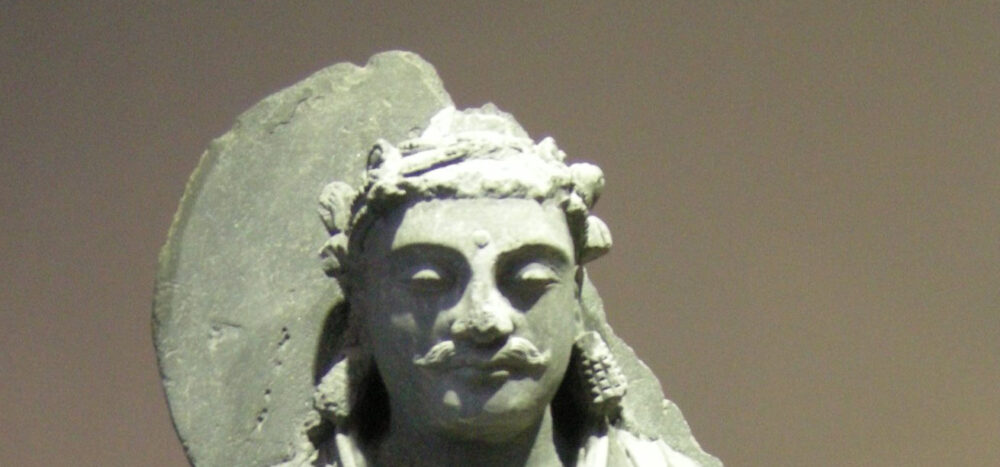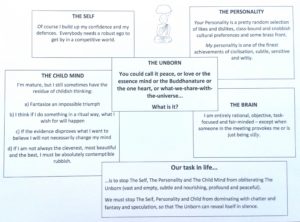For the purposes of this argument we’ll identify five elements to our psychology: The Self, The Personality, The Brain, The Child Mind, and The Unborn.
The Self
is a piece of software running in babies from birth which looks out for its needs and wants: primarily food, warmth, attention, interaction, and whatever takes its fancy. It looks out for our interests, and as we grow up it wants more sophisticated things, like reputation, success, appreciation, status, love. It compares itself with others and veers moodily between feeling superior and feeling inferior, feeling powerful and feeling powerless. It is self-obsessed and churns out excuses, denials and rationalisations necessary for its self-regard. It reacts instantaneously with its likes and dislikes, constantly alternating, as the Buddha taught, between attraction and aversion, going towards (the movement of greed), and running from (the movement of hatred), fight and flight. The funny thing is that we fondly imagine that this really is our self! “Me.” No. It is the same self-concerned stuff as everybody else’s. But all that attraction and aversion, picking and choosing, dignified with the name of “good taste” (judged as appropriate to your cultural group), leads directly to….
The Personality
A mixture of
- Taste in music, design, books, clothing, cars, entertainment, lifestyle, friends and so on, based on the Self’s likes and dislikes, picking and choosing as appropriate to one’s class and ambitions in a self-defining, self-projecting way
- Identity attachments (culturally a Celt, a Manchester United fan, a Labour voter, a feminist, a Buddhist), the grander expressions of attraction and aversion choices
- Education, special skills, specialist knowledge, profession, management experience, manner of wielding authority
- Habits and conditioning, much of it from parents and childhood experiences, shaping one’s emotional disposition (I, for example, am terrified of anger, from a family that suppressed all expression of anger ; I have a friend who is very much at ease with anger, a familiar friend to it, from a family happy with flare-ups)
- Inherited dispositions (tall, strong, athletic, intelligent, clumsy, prone to heart trouble) and learned behaviours which may have developed often admirable qualities of character: courage, determination, confidence, patience, kindness, for example.
The Brain
Which comes into its own at work, discriminating, reasoning, assessing, arguing on the evidence, drawing upon experience and knowledge, reporting accurately, taking objective decisions. Not used as much as we like to think.
The Child Mind
Which persists into adulthood and old age. It likes fantasies, magical explanations, blaming, sulking, and extremes (things are either perfect or dreadful). It clings to what it wants to think, even in the face of conclusive evidence to the contrary.
The Unborn
The Original Face, the Deep Self, the Ground of Being, the One Mind, the Essence of Mind, the Buddhanature, or whatever you call it: the sense of life that you find within you, and find mysterious, not sure whether its energy comes from inside or outside, and not sure what it is, except that you find it nourishing and strengthening. It is the peace at the heart of you that you find in meditation and at times when you forget the Self and merge with nature, giving yourself up to something greater. But is it something special with its own qualities? Or is it simply the sense of life of the default state of an ordinary mind when undistracted, cleared of conditioning and self-concern? The Unborn is perhaps a default state that is both luminous, and “nothing special”! One can experience it, but not know it.
Our task in this life is to stop the Self, Personality, and Child Mind from obliterating the Unborn.
Chattering mind, fantasies, busy busy-work, entertainments, anxieties about self, fears for the future and endless trains of circular, repetitive thought blot out the sense of life in the present, the sense of being vividly alive now. To set the Unborn free we must get control of the Self.
With grateful acknowledgements to A Life of One’s Own by Joanna Field (Marion Milner) Chatto and Windus 1934, Virago 1986.

